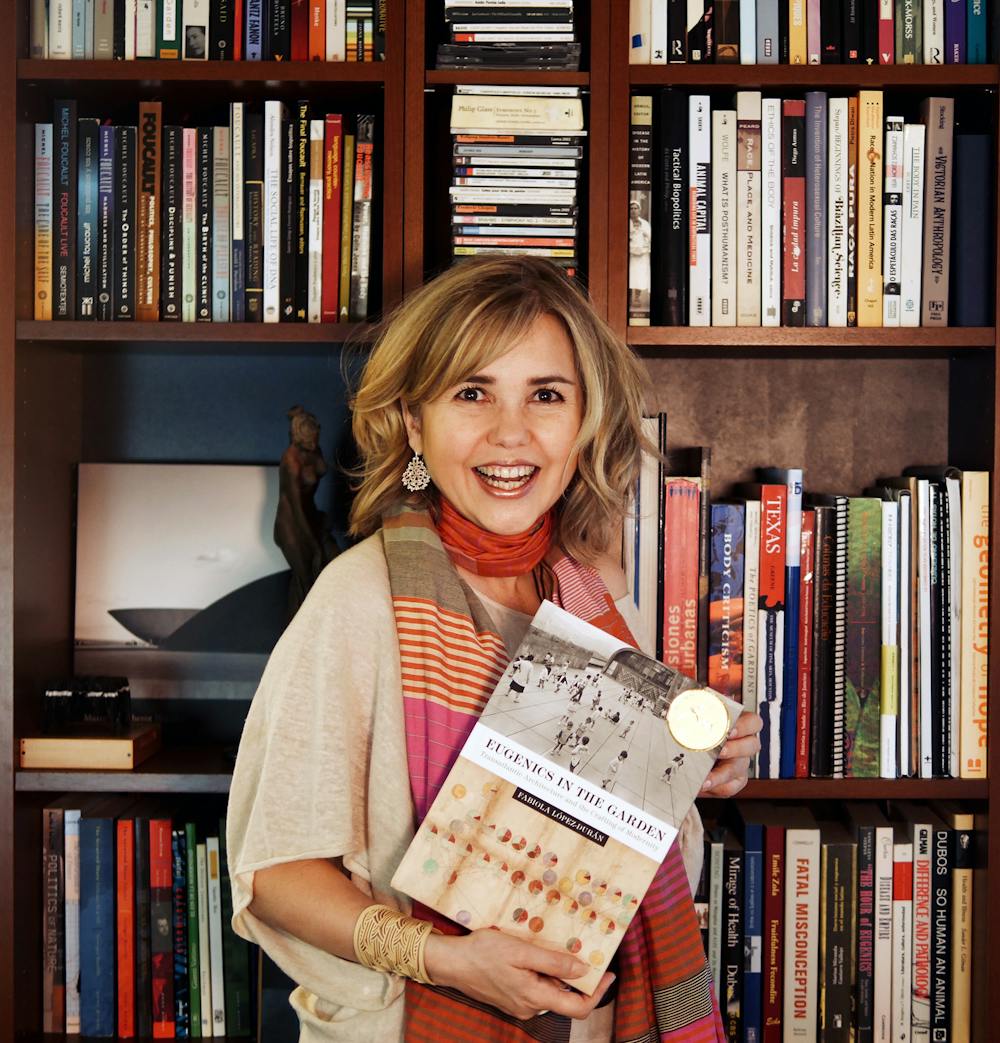Rice art professor Fabiola López-Durán designs her own path

Fabiola López-Durán didn’t always want to be a historian of art and architecture; in fact, she was first trained as an architect at Universidad de Los Andes in Venezuela.
“I very, very quickly realized I was more interested in thinking about architecture … than making architecture,” López-Durán said.
López-Durán, associate professor of modern art and architecture at Rice and the Hanszen College magister, attended graduate school in Italy and France. She said she was fascinated by how the field of architecture also overlapped with art and biomedical science. At the center of her work lies an interest in the role of architecture in processes of land dispossession, environmental disasters, systemic racism and other forms of inequality.
“What I’m interested in is mainly looking at architecture from different points of view — rather than celebrating the artifacts and the author of those architectural artifacts — starting from different issues that are connected to social, political and economic life,” López-Durán said. “For example, my first book ‘Eugenics in the Garden: Transatlantic Architecture and the Crafting of Modernity,’ investigates a particular strain of eugenics that, at the turn of the twentieth century, moved from the realms of medicine and law to design, architecture and urban planning.”
After teaching about architectural research and inquiry in Venezuela, López-Durán decided to earn a Ph.D. in a language she didn’t know — English.
“I decided to learn a new language in order to do a Ph.D. here at MIT … and probably that has been the best decision of my life,” López-Durán said. “My training at MIT changed my life.”
López-Durán then moved to Houston to join Rice in 2011. She said that she loves the freedom she has in her research and the collaborative nature of her teaching.
“My favorite part of my work is when I work with others,” López-Durán said. “I think that collaborative work, either teaching or researching, is the best that we can do, because it’s where real, new knowledge is built, it’s where we are keeping ourselves accountable, it’s where we are getting better as people, researchers and teachers.”
López-Durán’s latest book, a co-edited volume with scholars around the world that took a decade in the making, was launched last Friday at Columbia University’s Buell Center for the Study of American Architecture.
“In the process of conceiving and writing it, we created a co-learning community … one which required us to push past our isolated disciplinary silos,” López-Durán said. “It was a truly collaborative project and I am very grateful for the journey of its production.”
The project sees López-Durán come a long way since the beginning of her teaching career in Venezuela, when she was the only woman of the five faculty members in her department. She said that now, the weight of this is clearer to her.
“I see that my strength and independence of thought, and clear understanding of myself comes from my parents, but in particular, my dad, who taught me to respect myself, to believe in myself, to be independent, to love working hard,” López-Durán said. “Every time that I’m teaching, every time that I’m saying something that I’m very convinced and passionate about, I always feel like there is a lot of responsibility, but I hope that that will be a way of inspiring young women … to walk this world … with the confidence and ability that will allow us to make important changes in the world.”
More from The Rice Thresher

Thresher’s guide to arts and entertainment in Houston
New to the city? Unsure how to spend your time procrastinating on homework? You’re in luck — Houston is a playground if you know where to look, and most of it is an easy metro ride or short commute from campus. Here’s a starter pack of spots that deliver fresh air, brain food and the occasional “wait, this is in Houston?” moment.

Thresher’s Lollapalooza report: Who ruled Grant Park?
Chicago’s Grant Park ran on pure dopamine this weekend — surprise debuts, late-but-worth-it arrivals, confetti, fireworks and at least three mass sing-alongs an hour. From Joey Valence & BRAE road-testing new indietronica to A$AP Rocky cracking open his vault, T-Pain turning the field into karaoke and Olivia Rodrigo summoning Weezer, Lollapalooza felt like a live-wire mixtape. Doechii built a universe, TWICE made history and Sabrina signed off with a superstar-cementing finale. Here’s what actually lived up to the skyline.
“Ginny & Georgia” Season 3: A Messy, Magnetic Villain Origin Story
I’ll admit it: I came into “Ginny & Georgia” expecting another glossy Netflix soap that looks great in a weekend binge but evaporates from memory by Monday. By the end of season three, I realized I’d been doing something I rarely do with shows like this: I was taking notes. Not on the plot (though it’s as twisty and outrageous as ever), but on the characters. I loved them. I was grinning from ear to ear watching them scheme, stumble and monologue their way through impossible situations. That’s when I knew: this show had done something right.


Please note All comments are eligible for publication by The Rice Thresher.